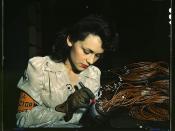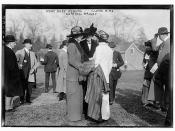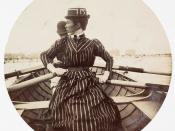Southern Women's Roles and how they Change with the War
Before the war, many slaveholding women in the South tried to become the women their society had designed for them, which meant to become a lady. Southern ideology emphasized the ideal of the southern lady as gracious, fragile, and respectful to the men she depended on to take care and protect her. She was expected to be literate. Through reading they extended the implications of their everyday lives and sought models of personal excellencies. Their culture, including personal and social relations, taught that their identity had no meaning apart from privilege and duty. The privileges of their station set them apart from white non-slaveholding and black slave women. Women proved indispensable to these privileged households and the production and reproduction that defined the southern household. They had specific roles set in their society. Their roles closely followed the prevailing norms of division of labor by gender and women were expected to follow them closely.
Once the war started, all of this changes. Women were expected to take on new roles as their whole society got flipped.
As a girl, a woman's primary responsibility was to prepare herself for her adult life. Young white women were expected to concentrate on learning the various duties they would have as mistresses. This was not something all daughters enjoyed doing, but nonetheless had to do. Even though they may not of enjoyed the work they had to do, many of them anticipated marriage and realized the importance of learning domestic skills. They knew that their primary duty was to attract husbands with suitable wealth, status, and breeding. Many were excited for this. They looked forward to the glamorous life of the Southern belle. Younger girls longed of the day when they could lower...


